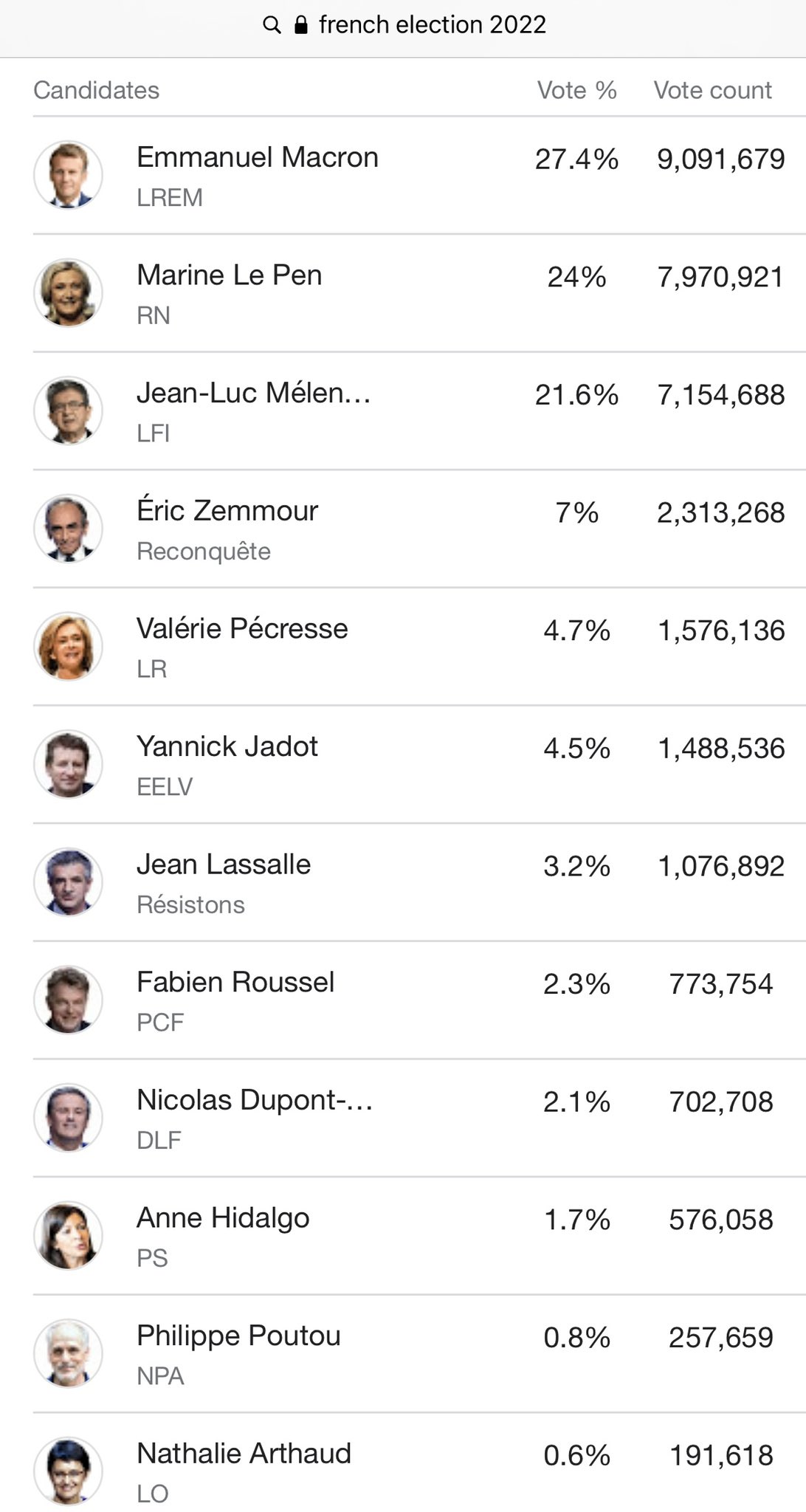So, this is probably the best commentary on why it’s close:
see if you can find when Macron announced he was going to raise the retirement age https://t.co/sJyiezKPJ9 pic.twitter.com/bz3MUpZiPh
— accidental larouchite (@lib_crusher) April 8, 2022
The current French retirement age is 62. Macron has said that, if re-elected, he will increase it to 65. Le Pen will decrease it to 60.
France has a run-off system. The top two candidates are pitted against each other in the second round. In the first round, results were approximately as follows:

Note that Jean-Luc Melenchon, the left-wing candidate, was less than three percent behind Le Pen.
Melenchon’s policies?
His manifesto includes lowering the age of retirement, hiking the minimum wage, and freezing food and fuel prices.
As a public denouncer of the free-market economy, Mr. Melenchon advocates “state intervention in the economy” to spread wealth, guaranteeing what he calls a “dignified life for all workers.” He told a campaign rally in Paris he would heavily tax the wealthy.
…
Mr. Melenchon said: “The free market, as you see, is chaos. Another world is possible.”
If he takes office, Mr. Melenchon hopes to pass a “social emergency law” as soon as possible, which would increase the minimum wage to €1,400 per month (from €1,269.03 at present) and cap salary differences between workers and CEOs at one to 20.
He pledged to enforce greater controls on the movement of capital, and guaranteed jobs for the long-term unemployed.
He also announced plans to give 800,000 public sector workers on temporary contracts a permanent tenure – as well as plans to prevent top companies listed on the French stock exchange from paying dividends.
He wants to lower the retirement age in France from 62 to 60, unlike Mr. Macron who currently wants to raise it to 65 to “balance the pension bill.”
As a keen proponent of mass wealth redistribution, Mr. Melenchon also wants to boost the capital gains tax up to the same level as income tax and introduce a progressive corporate tax, as well as seize inheritances greater than €12 million.
That’s a very left-wing program in the current context.
Meanwhile, as John Nichols points out:
If supporters of the French Socialist, Communist, Trotskyist, and Green parties had backed left-wing presidential candidate Melenchon, he would not merely have beaten Le Pen. Melanchon would have finished in first place, ahead of Macron.
So, because the left won’t cooperate with each other, they have wasted a good chance of a real-left wing government, and the French are now forced to choose between a nativist fascist (who, among other things, would not allow single women to have in vitro fertilizations), and an arch-neoliberal who wants to make everyone but the rich poorer.
Neoliberals have wanted to cut pensions for ages (true also in the US and almost everywhere else), so Macron is making the bet that people will hold their noses and vote for him, rather than for Le Pen. But the swing is five years; if Macron wins, you retire at 65, while if LaPen wins you retire at 60.
Strangely enough, old people prefer Macron, and young people prefer Le Pen:
Macron vs Le Pen, YouGov poll
Macron: 51%
Le Pen: 49%By age
18-24: Macron 44%, Le Pen 56%
25-34: Macron 47%, Le Pen 53%
35-44: Macron 47%, Le Pen 53%
45-54: Macron 49%, Le Pen 51%
55+: Macron 55%, Le Pen 45%Source: https://t.co/K74bCr7l6r
— Populism Updates (@PopulismUpdates) April 8, 2022
Which is to say the strategy of forcing votes against the reactionary right-winger will work, until it doesn’t. Polls suggest it will work, again, this time, but polls have often been wrong in such close cases, and polls suggest it won’t keep working.
The Left will have one more chance to get its act together before the next election. It had best take that chance. Fortunately, Le Pen’s economic policies are foolish and won’t entirely work (not because of the pension age, but because she still wants to make the rich, richer), but once reactionaries get in power, they tend to use their power to crush the Left.
France is one of the few places in the “developed” world where the Left still stands a good chance of getting into power. Once they do, if they run the economy well (which will be easy, because the world order which made it impossible is dying), then they can create generational change and lock in left-wing politics for 30 to 50 years.
If they don’t, however, the Right will set the new ideological terms.

 So, the Yellow Vests in France have French President Macron scared, and he has given to some of their demands, including raising the monthly minimum wage and getting rid of the diesel tax which sparked the original protests.
So, the Yellow Vests in France have French President Macron scared, and he has given to some of their demands, including raising the monthly minimum wage and getting rid of the diesel tax which sparked the original protests.
